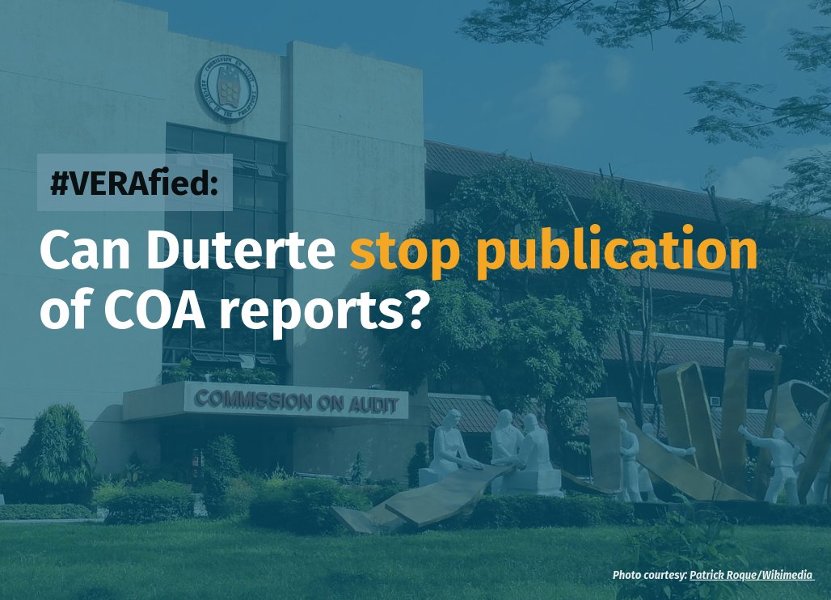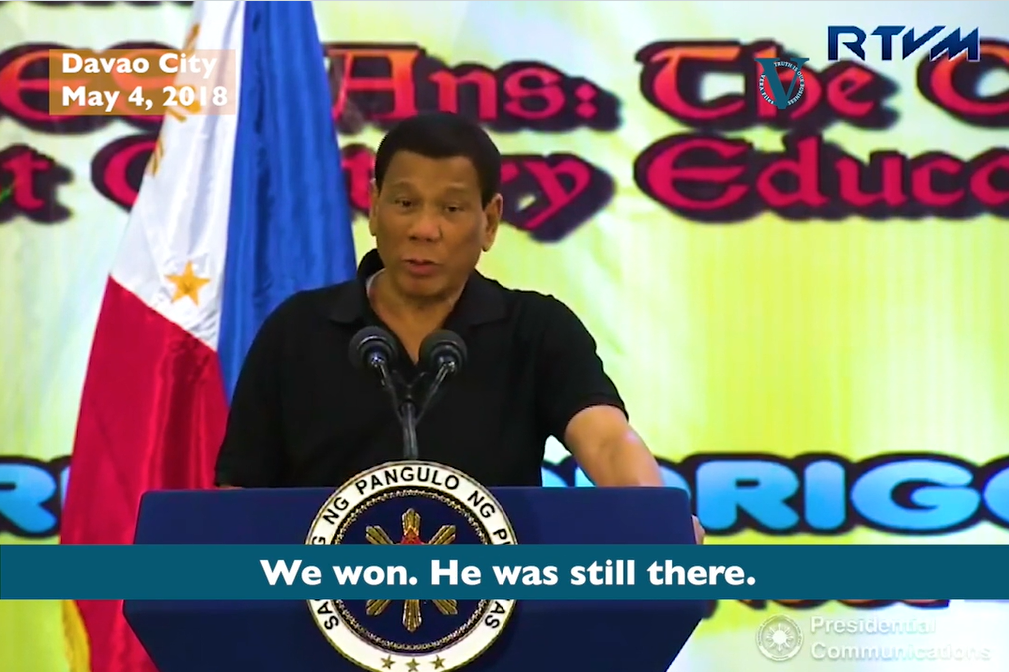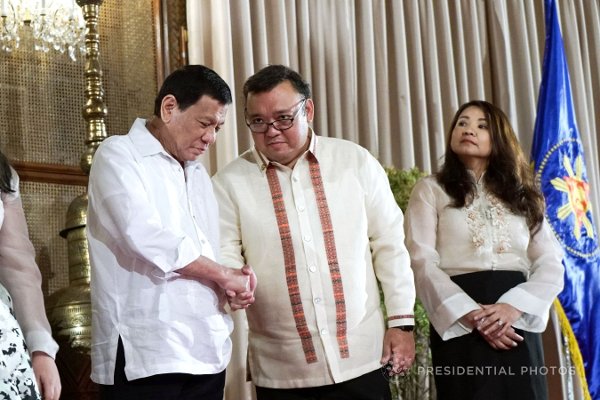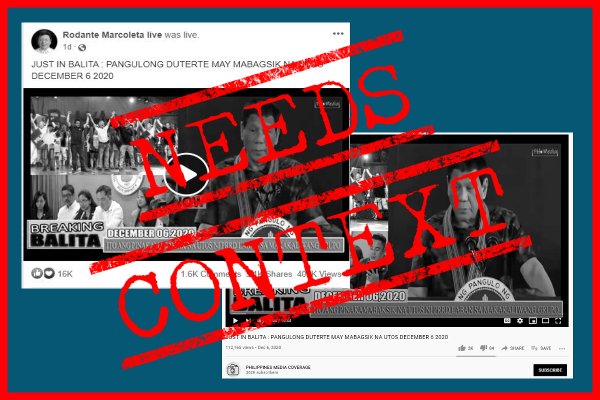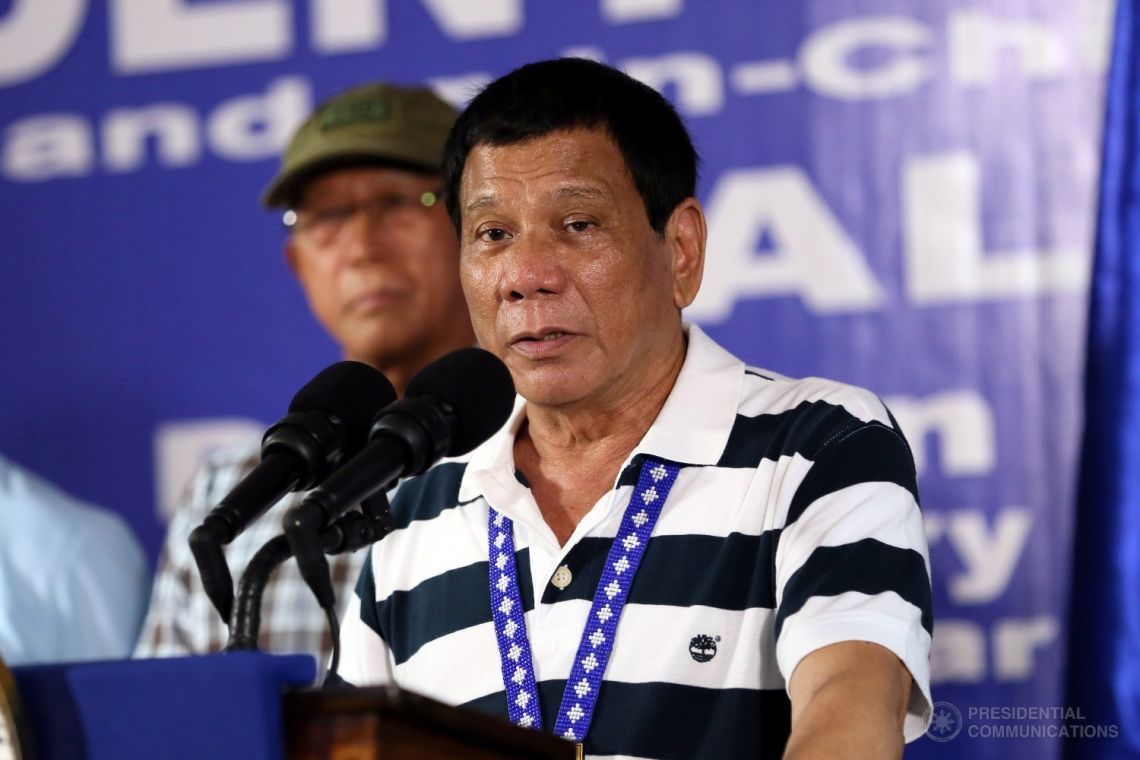
President Rodrigo Duterte said he will provide everything the armed forces asks for, even if it takes breaching government procurement rules.
STATEMENT
In a speech in Butuan City on June 17, Duterte promised the military top-tier defense equipment and quality health services, and said:
“Sabi ko sa (I told) COA, huwag silang makialam diyan sa (they should not interfere with the) lowest bid-lowest bid. Kalokohan iyan (That’s foolish). The lowest bid actually is the source of all corruption….Wala akong bidding-bidding basta kailangan ng military, Armed Forces, police. (I won’t observe bidding for as long as the military, armed forces and the police need it.)”
Source: Talk to the Troops, Butuan City, June 17, 2017, watch from 15:08 to 15:53
FACT
The president got three things wrong.
First, it is not the Commission on Audit (COA) that conducts the bidding process, based on Procurement Service – Philippine Government Electronic Procurement System (PS-PhilGEPS) rules. This was confirmed by PS-PhilGEPS Executive Director Bingle Gutierrez.
The bidding process for the purchase of goods, consulting services and infrastructure projects is spearheaded by the respective Bids and Awards Committee (BAC) designated by the procuring government agency, not the COA, according to Republic Act No. 9184 or the Government Procurement Reform Act (GPRA).
The COA, which audits all government expenditures, only ensures transparency in the process by sending an observer to sit in the proceedings, the Government Procurement Policy Board (GPPB) told VERA Files.
Observers are tasked to prepare, either jointly or separately, a report assessing the BAC’s compliance with the provisions of the law and noting areas of improvement. They shall also inhibit and notify in writing the Procuring Entity of any actual or potential interest in the contract.
Non-submission of report within seven calendar days after each procurement activity presumes that the bidding followed the correct procedure.
In addition, according to the Generic Procurement Manual of the GPPB, observers are required to sign as witness in the Abstract of Bids and in the post-qualification summary report, if they find the entire bidding process was conducted correctly vis-a-vis the provisions of R.A. 9184.
Second, Duterte cannot order COA to ignore bidding rules.
There is no provision in the law that allows for the president to order an institution to bypass the bidding process, the GPPB told VERA Files.
Central to the GPRA is the requirement of “competitive bidding” or “public bidding,” which opens the entire bidding process to any interested party, regardless of whether the source of funding is local or foreign.
The BAC evaluates the bids, or the signed proposal submitted by a supplier, manufacturer, distributor, contractor or consultant, in terms of their technical and financial components.
For the technical component, the BAC assesses whether all required documents are present through a “pass or fail” scheme.
Only those that pass shall be eligible for opening and evaluation of their financial component, which shall be ranked from lowest to highest in terms of their calculated prices.
The bid with the lowest calculated price shall be referred to as the “Lowest Calculated Bid” or the “Highest Rated Bid,” what Duterte referred to in his speech as the “lowest bid.”
Even then, the “Lowest Calculated Bid” has to undergo a post-qualification process, where bidding documents will be verified and validated.
If the bidder with the Lowest Calculated Bid passes all the criteria for post-qualification, its bid shall be considered the “Lowest Calculated Responsive Bid,” in the case of goods and infrastructure or the “Highest Rated Responsive Bid” in the case of consulting services.
However, if a bidder fails to meet any of the requirements or conditions, it shall be “post-disqualified” and the BAC shall conduct the post-qualification on the bidder with the second Lowest Calculated Bid or Highest Rated Bid.
The procedure is repeated until the Lowest Calculated Responsive Bid to which the contract shall be awarded is finally determined.
Where applicable, the government can resort to alternative methods of procurement in order to ensure economy and efficiency, provided that the most advantageous price is obtained. These include limited source bidding or selective bidding, direct contracting, repeat order, shopping and negotiated procurement.
In 2015, the Supreme Court ruled that the Commission on Elections (Comelec) committed grave abuse of discretion amounting to lack or excess of jurisdiction when it failed to justify its reasons for resorting to direct contracting method with technology provider Smartmatic-TechnoIogy Information Management instead of opening the bidding process to the public. As a result, the contract was nullified.
Third, neither the military nor the police is exempt from the GPRA.
Clearly, the law states that “all branches and instrumentalities of government, its departments, offices and agencies, including government-owned and/or-controlled corporations and local government units” are covered.
The same standard applies to the military, especially if the source of funding is provided by the General Appropriations Act, PS-PhilGEPS’ Gutierrez said.
The AFP Corps of Engineers (AFPCOE), a reserve command of the military, is also capable of undertaking infrastructure projects. In procuring goods, supplies and services, it shall abide with the provisions of R.A. 9184, according to Appendix 13, Article 8, Section 8.2 of the law’s implementing rules and regulations (IRR).
Further, defense procurement is covered by Republic Act No. 10349 or the Revised AFP Modernization Act of 2012. Chapter 3, Article 3.4.8 of its IRR reads: “all procurement shall be done through competitive bidding, provided that the Department of National Defense-AFP may avail of the exceptions provided under R.A. 9184, its IRR and issuances of the GPPB.”
Sources:
Bishop Broderick S. Pabillo v. COMELEC, G.R. No. 216098
DND Department Circular No. 3, Issuing the Implementing Guidelines, Rules and Regulations of the Revised AFP Modernization Act of 2012
Generic Procurement Manual of the Government Procurement Policy Board
Republic Act No. 9184 or the Government Procurement Reform Act
The 2016 Revised Implementing Rules and Regulations of Republic Act No. 9184

